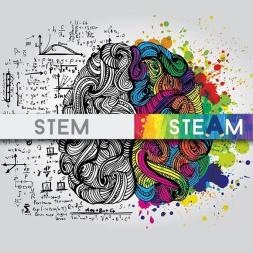
STEM And STEAM
'STEM and STEAM' course integrates Science, Technology, Engineering, Arts, and Mathematics for a holistic teaching approach. Focused on interdisciplinary learning, it empowers educators with strategies for creative lesson planning, hands-on projects, and addressing challenges. The course ensures teachers can deliver dynamic, engaging experiences, fostering lifelong learn learning in students.
Description
Day 1: Foundational Pillars
- Unpacking STEM & STEAM: definitions, benefits, impact
- Unveiling interdisciplinary magic: why it matters
- Igniting creativity: fostering problem-solvers and innovators
- Exploring successful models: learn from the best
Day 2: Project Powerhouse
- Building impactful projects: strategies for engagement
- Real-world connections: weaving problems into projects
- Resourceful educators: tapping into rich STEM & STEAM tools
- Intertwining disciplines: crafting lesson plans that sing
Day 3: Tech & Engineering Fusion
- Classroom as makerspace: embracing technology & tools
- Hands-on exploration: engineering for educators
- From pixels to prototypes: digital fabrication unleashed
- Designing tech-driven projects: students as creators
Day 4: Artful Inspiration
- Arts as STEM's secret weapon: unlocking creativity & expression
- Visually captivating: integrating visual & performing arts
- Unleashing design thinking: solving problems with artistic flair
- Case studies: celebrating successful STEAM integration
Day 5: Math & Science Inquiry
- Making math meaningful: real-world applications spark interest
- Scientific sleuthing: conducting research in the classroom
- Accessing the fun: strategies for engaging math & science
- Data detectives: integrating analysis & computational thinking
Day 6: Assessment & Growth
- Measuring success: effective STEM & STEAM evaluation
- Aligning assessments with learning goals: formative & summative
- Feedback & reflection: fueling student growth
- Building rubrics & tools: assessing interdisciplinary projects
Day 7: Future-Focused Educators
- Integrating STEM & STEAM into the curriculum: a comprehensive plan
- Sharing & refining: feedback loops for project improvement
- Continuous learning: strategies for professional development
- Building a community: cultivating a STEM & STEAM network
Embrace the future, shape young minds – join us!
Learning objectives
COURSE OBJECTIVES:
- Comprehend STEM and STEAM Fundamentals: Educators will develop a deep understanding of the principles of STEM (Science, Technology, Engineering, and Mathematics) and STEAM (including Arts), and the importance of an interdisciplinary approach to education.
- Design and Implement STEM/STEAM Projects: The course aims to equip teachers with the skills to design and implement engaging and effective STEM and STEAM projects and activities in their classrooms.
- Foster Critical and Creative Thinking: Participants will learn strategies to encourage critical thinking, problem-solving, and creativity among students through interdisciplinary projects.
- Integrate Arts into STEM Education: Educators will explore ways to effectively integrate arts into STEM education, enhancing student engagement and learning experiences.
- Address Challenges in STEM/STEAM Education: The course will cover the challenges of integrating STEM and STEAM in the classroom and strategies to overcome these, including resource constraints and ensuring inclusivity.
- Promote Real-World Application of Knowledge: Participants will learn how to use real-world problems as a basis for curriculum development to make learning more relevant and engaging for students.
LEARNING OUTCOMES:
- Mastery of STEM and STEAM Concepts: Participants will demonstrate a comprehensive understanding of STEM and STEAM education, including their benefits and methodologies.
- Effective Project Design and Implementation: Educators will be adept at creating and implementing interdisciplinary projects that effectively combine elements of STEM and STEAM.
- Enhancement of Critical and Creative Skills: Teachers will have the skills to foster critical thinking, creativity, and problem-solving through project-based learning.
- Integration of Arts in STEM: Participants will effectively incorporate arts into STEM education, creating a more holistic and engaging learning experience.
- Navigating Educational Challenges.
Methodology & assessment
Methodology:
Foundational Pillars: Interactive lectures unpack definitions, benefits, and successful models, fostering a comprehensive understanding.
Project Powerhouse: Practical workshops guide educators in designing impactful projects, integrating real-world problems, and crafting interdisciplinary lesson plans.
Tech & Engineering Fusion: Hands-on sessions immerse participants in educational technology, basic engineering principles, and digital fabrication for technology-driven projects.
Artful Inspiration: Explore techniques for incorporating visual and performing arts, unleashing creativity through design thinking workshops and case studies.
Math & Science Inquiry: Make math meaningful with real-world applications, delve into scientific inquiry, and integrate data analysis for accessible and engaging learning.
Assessment & Growth: Equip yourselves with effective assessment methods, aligning formative and summative assessments with learning goals, and crafting rubrics for interdisciplinary projects.
Assessment:
Project Development & Refinement: Develop comprehensive project plans throughout the program, receiving valuable peer feedback for continuous improvement.
Reflective Practices: Integrate student feedback and reflection to deepen understanding of impact and guide ongoing improvement.
Rubric Creation: Master the art of crafting effective rubrics for fair and objective evaluation of interdisciplinary projects.
Community & Growth: Join a vibrant community of STEM & STEAM educators, sharing resources and strategies for continuous professional development.
Certification details
CERTIFICATE OF PARTICIPATION & EUROPASS MOBILITY DOCUMENT
Pricing, packages and other information
-
Price:80Euro
Additional information
-
Language:English
-
Target audience ISCED:Primary education (ISCED 1)Lower secondary education (ISCED 2)Upper secondary education (ISCED 3)
-
Target audience type:TeacherHead Teacher / PrincipalNot-for-profit / NGO staff
-
Learning time:25 hours or more
Past sessions
More courses by this organiser

Integrative Strategies In Digital & Technical Entrepreneurship



